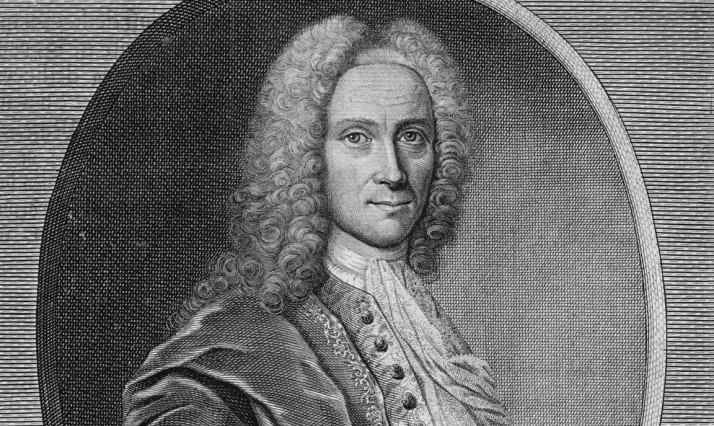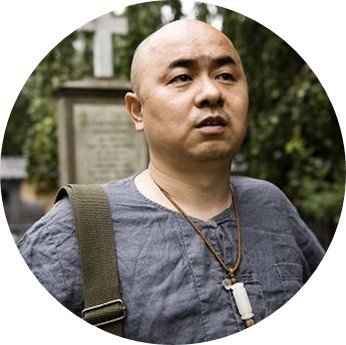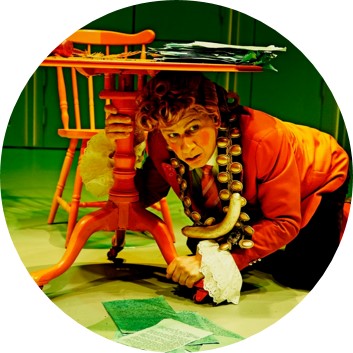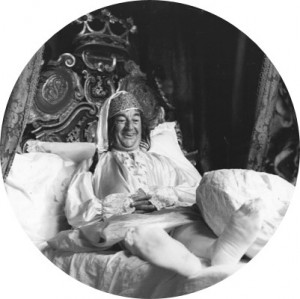Holberg in China: A theatrical project that reaches across

On September 2 and 3 at the Danish Cultural Center in Beijing one has the rare opportunity to experience a special production of two comedies by Danish playwright Ludvig Holberg under the title ‘Holberg in China’. While names such as H. C. Andersen and Kierkegaard are by now fairly well known in China, Holberg has yet to be translated into Chinese and thus remains quite unknown.
With the project ‘Holberg in China’ the people behind it are hoping to familiarize China with his works. But what is special about the comedies of Holberg since they might be interesting for the Chinese audience? Danish Cultural Institute met with Jimbut Jun Feng, who has produced the translations from Danish to Chinese of the two comedies, for an interesting talk on how comedy may help us reflect on ourselves, and the challenges one faces, when you translate from Danish as it was written in the 18th century into modern day Chinese.

The production consists of the two comedies ‘Jeppe on the Mountain’ and ‘The Political Tinker’, which were both written by Holberg in the 1700s. Jimbut Jun Feng has translated the plays into Chinese, Gritt Uldall-Jessen is the dramaturg, Cai Yiyun and Anna Andrea Malzer staged the plays and the readings are performed by students from the acting department of Communication University of China.
“My colleague Gritt went to China last year to see the production of her play ‘The Little Mermaid’ in Beijing. On this occasion she visited the Danish Cultural Center in Beijing for a tour around their spaces. Gritt and Eric [Messerschmidt, director of the Danish Cultural Center of Beijing] both agreed that if in the future there would be any productions of Danish plays in China, the Danish Cultural Center in Beijing could serve the purpose well.”
The project “Holberg in China” must firstly present Holberg’s texts for a Chinese audience. But in a long-term perspective, it will contribute to the development of the Danish stage art and foster a dialogue across continents and national borders. It will permit a series of personal encounters between professional Danish and Chinese stage artists with the aim of inspiring, motivating, and strengthening the Danish stage art internationally, and hopefully lead to more artistic collaborations between Denmark and China. The composition of the team behind the production clearly reflects the focus on collaboration and cultural exchange, which the production seeks to create. A collaboration, which Jimbut has high expectation for:
“We had the experience in 2014 at our “Chinese Drama Reading Festival” (link: http://detfriefeltsfestival.dk/work/readingfestival-for-kinesisk-dramatik/) at Forsøgsstationen (The Experiment Lab Station) in Copenhagen of having Chinese directors direct Danish actors doing Chinese plays. The Chines plays were translated into Danish.
Back then we had expected that the language barrier would influence the production, but in the end everyone was really satisfied about the results. For that production we had more of an theatrical focus and made a lot of valuable experiences. This time we are very happy to be working with the Danish Cultural Institute, because our focus lies on cultural exchanges between Denmark and China.”
What Holberg does: the potential of comedy
Holberg is not the first Nordic playwright to have a play produced in China. In Jimbut’s words, Norwegian playwright and poet Henrik Ibsen has achieved great popularity.
“In Chinese theater, I think Ibsen is as important as Shakespeare. During Mao, it wasn’t the plays of Shakespeare, but of Ibsen, that people saw and knew. Ibsen was known as a representative of the social-critical realism, which suited the political agenda of the time nicely. His themes are very serious. But Holberg’s dramas are comic and absurd. Holberg is a part of the Danish Culture Canon, and I think it is fair to say that Holberg is a part of the common Danish language. From a Chinese perspective, I think it is interesting to see a form of traditional production, which has never been to China before, because Holberg is so different from what people have come to expect through Ibsen. If something is traditional, you automatically assume that it is realism. But Holberg works with comedy and the absurd, not psycho analysis or social realism.

Jimbut is enthralled with the plays of Holberg because of their humorous aspects, but his interest reaches deeper. In his view, comedy carries the potential to do much more than simply making the audience laugh:
“Like the drama ‘The Political Tinker’ teaches us, it is very important to look inwards. A given society can be constructed on a perfect system, but if its citizens do not learn to look inwards and think for themselves, it is no good. I think that comedy is a great way to make people think. Instead of having a finger raised at them, the audience gets some good laughs. When they leave, they may just begin to reflect upon and mirror themselves in the actions of the characters: ‘am I like this, too?’ Take the character Jeppe from ‘Jeppe on the Mountain’ as an example. He is an irresponsible drunk who can rarely be bothered to do much. When one day, he wakes up in a new position as the local baron in the former barons bed, he turns out to be much crueler and more suppressive than the former baron – despite having always complained to others, when he has treated unjustly.”
“The plays of Holberg provide us with the problems of the unenlightened individual. It is the problems of such individuals, and not just the problems of society in general, which his plays mirror. When such plays present us with the problems in society, we know that these individuals contribute to them themselves – although they do not realize it. I think that is an interesting angle in a Chinese context. In China, after the revolution, rational thinking was strongly employed to educate the population for revolution and enlightenment. But it did not succeed. Perhaps it is time to take a step back to the more primitive, human level which Holberg represents. With Holberg’s plays you give people a mirror, not a lecture, for them to learn something from and develop by.”

How do you translate daler into Chinese Yuan?
Behind the scenes lies a great amount of work translating the plays from an older form of Danish to Chinese. This kind of work is not unchartered territory for Jimbut, who has already translated 10 works by Kierkegaard. But when translating from Danish as it was written by Holberg in the 18th century, one may still encounter unexpected challenges:
“My first work in translation was to translate Kierkegaard to Chinese, which was quite the task. Kierkegaard writes in Danish as it was written in the middle of the 19th century, so you may come across many words in his texts, which cannot be looked up in contemporary dictionaries. But Holberg’s works are from 100 years earlier, which his language bears the touch of. Luckily, a lot of his works have been republished with detailed notes and in a more contemporary form Danish, which makes the text more accessible to me and the process of translation much easier. But when I translate for readings, there are of course many things to keep in mind. For example, converting amounts of money into something which largely corresponds to contemporary Chinese amounts. Back in Holberg’s days they used daler, which is nothing like the Danish Kroner of today.”
What comes next
While the production in Beijing has yet to premiere, Jimbut has ideas brewing for several projects:
“In the future I would like to translate more of Holberg’s works. My plan is to talk to a Chinese publisher, who might be interested in publishing his works in China. That would give me the chance to translate 6-8 of Holberg’s works and publish an anthology. If the production in Beijing turns out a success, it might be interesting to continue the cultural exchange by bringing the Chinese director and the Chinese actors to Copenhagen to show a Chinese production of Holberg in Denmark. But we will have to wait and see.”
Program:
Saturday, September 2nd 2017
2:00 PM Reading ”The Political Tinker” staged by Yiyun Cai. Dramaturge is Gritt Uldall-Jessen.
4:30 PM Reading ”Jeppe on the Mount” staged by Anna Andrea Malzer. Dramaturge is Gritt Uldall-Jessen.
Sunday September 3rd 2017
2:00 PM Reading ”Jeppe on the” staged by Anna Andrea Malzer. Dramaturge is Gritt Uldall-Jessen.
4:30 PM Reading ”The Political Tinker” staged by Yiyun Cai. Dramaturge is Gritt Uldall-Jessen.
‘Holberg in China’ is a co-production between Nydanskeren Jimbuts Kulturforening and the Danish Cultural Institute in Beijing. Other collaborators include the Danish National School of Performing Arts, Beijing Fringe Festival, Teater Grob and Communication University of China.
Support has been given by the S. C. Van Foundation, Teater Grob, The Danish Arts Foundation’s Committee for Literary Project Funding, and The Danish National School of Performing Arts.
Contributors:
Translator: Jun Jimbut Feng
Curator for the reading: Gritt Uldall-Jessen
Staging: Anna Andrea Malzer and Yiyun Cai
Actors: Mu Qucheng, Sun Niu, Wang Yidi, Liu Sichen, Ye Lin Yingzi, Ren Zixian, Zhang Hao, Liu Jun, Liu Bateer og Wang Dongping
Dramaturg: Gritt Uldall-Jessen
Interpreters: Zhang Yue and Jimbut Jun Feng
Consultant: Shao Zehui